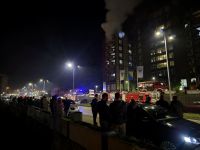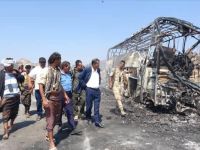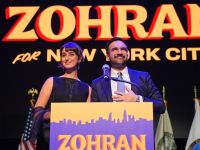The United Nations was groping Friday for ways out of deadlock in the Moroccan-occupied Western Sahara after talks aimed at bringing about a referendum on autonomy for the territory collapsed in Berlin.
A fruitless meeting between Moroccan delegates and the Polisario Front, which wants independence for the northwest African territory, broke up Thursday in the German capital, the guerrilla-backed movement said.
"We have not made any progress because Morocco refuses any referendum," said Polisario's UN coordinator Khadad Mhamed after the failure of the talks chaired by UN special envoy for the Sahara region and former US secretary of state James Baker.
The Moroccan delegation, led by Foreign Minister Mohamed Benaissa, was not available for comment.
Baker's bids to bring about a UN-organized referendum on the future of the territory, annexed and settled by Morocco after Spanish colonists left in 1976, have been stymied by constant rows over electoral lists.
In Berlin, the Moroccan side threw in the towel, instead suggesting direct talks with Polisario to find a different political solution to the 25-year-old conflict, on the basis of considerable autonomy but still as part of the kingdom.
However, the Polisario Front insists on a referendum it is convinced it could win. Early in the conflict, it founded a Sahrawi Arab Democratic Republic recognized by some member states of the Organization of African Unity (OAU) but not the United Nations.
Ahmed Boukhari, Polisario's envoy to the United Nations in New York said Thursday that Rabat's proposal "would take the dispute back to its starting point, meaning resumed hostilities and open armed conflict".
The proposal would also deprive UN forces deployed in the Western Sahara of any reason for being there, he added, since the mandate of the UN mission has been to pave the way for a referendum.
Diplomatic sources in Rabat, who asked not to be named, said that Morocco had made a concession since only weeks ago officials were refusing to talk to Polisario leaders and ruled out any possibility of a "third way".
The Moroccan proposal also had the merit of offering a possible step towards a way out of the impasse sought for years by a weary United Nations and also by the country's Western allies, one source pointed out.
The situation has changed to the extent that Morocco's young King Mohammed VI has moved towards more open politics than his late father, Hassan II and his entourage, although Moroccan leaders right across the political spectrum scarcely question the country's claim to the territory.
The Polisario Front has also over the years seen less enthusiastic backing from neighboring Algeria, whose southern desert border area is home to scores of thousands of refugees from the western Sahara, while a number of African countries have dropped their support.
Observers here agreed that the United Nations has been left in a difficult position. Its presence in the Western Sahara has helped ensure that a ceasefire signed in 1991 has largely been observed, although its real justification for being there is a referendum -- postponed ever since 1992.
It remains to be seen how Algeria will react to the deadlock. Still Polisario's main backer, President Abdelaziz Bouteflika told the London-based Arabic daily Acharq Al-Awsat this month that Algiers backed the UN referendum plan, but he added that he would not reject another solution if this would satisfy the Sahrawis.
A further round of talks is expected to take place before the end of October -- RABAT (AFP)
© 2000 Al Bawaba (www.albawaba.com)







